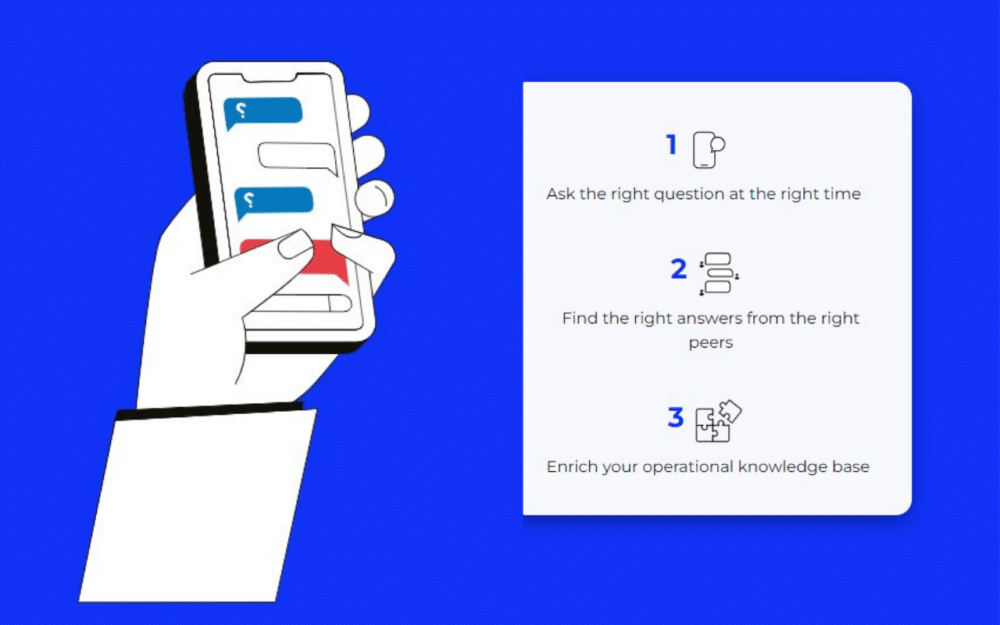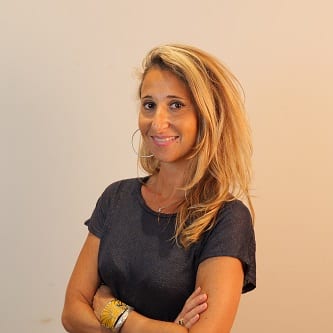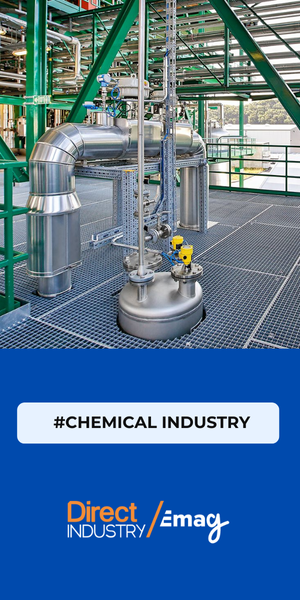The Parisian startup Ask for the Moon develops an AI-based solution for industries to provide all employees within a company with the knowledge and expertise of the company’s industry experts. The startup, which boasts clients such as Framatome, Airbus and SNCF, has recently raised 2.5 million euros. We met with the teams at the Global Industrie trade show last month.
Imagine you’re an engineer in a large French industrial company like SNCF, Airbus, or Michelin, responsible for modeling. And you have a simple question about the standard of the part you need to model. Someone in the company has this information, but who? Not all experts are necessarily identified in large organizations. Moreover, with sites around the world, the person who could help you is probably not in the next office. So it’s difficult to find the answer to your question.
Knowledge, the Engine of Performance
The Ask for the Moon platform is here to address this issue. Available as a white-label solution, it allows all employees of an organization to access the know-how and knowledge held by everyone through a personalized internal platform. The platform is highly specific to the company and its jargon.
Riyadh Draief, Project Engineer at Ask for the Moon, explains:
“I ask my question on the company’s Ask platform. It’s called Ask SNCF at SNCF, Ask Framatome at Framatome, etc. Then it’s like ChatGPT but with humans. We’re not talking to a black box, we’re talking to humans. When I ask my question on Ask, the artificial intelligence deeply understands my specific industry jargon to direct my question to the experts of the company previously registered as such on the platform. There are at least five identified experts who will be notified of my question and can provide me with their answers. And their response will be recorded on the platform, so another colleague who has the same question later on can access the exchange we had before, and the solution provided by the expert.”
As a result, if we take the example of the modeling engineer who has a question about a standard for his part, with Ask, he will get the answer to his question quickly. And he can also have complete confidence in the answer because, on the one hand, it is provided by a human and not a bot. And on the other hand, the other experts notified of the question are in the loop of the response. So they can validate the given answer.
The expert can answer the question with text or even illustrate their response with a video. They can also provide documents and highlight in such a document the relevant passage for their colleague, to save them from having to go through documentation that can sometimes span hundreds of pages. This results in considerable time savings. Finally, the colleague can be located in Germany while you are in France and still provide the answer in just moments.
For Bénédicte Tilloy, the co-founder of Ask for the Moon,
“80% of know-how is in people’s heads and often their skills are not in their CV. They are in the experience they have gained. And we can tap into that experience and make it available to everyone through questions.”
And it is AI that enables the right person to be matched with the right question.

Building the Database: Enterprise Language Model
How does it work in practice? The Ask platform is customized according to the professions and industrial sectors involved. This is why it is a white-label solution. But the starting point for any company remains the creation of a database and the profiling of industry experts.
The database is created with the client company (IT department, business managers, operational directors, business directors) and involves working on terminology.
Ask has therefore developed an ELM, Enterprise Language Model, capable of deeply understanding the specific industry jargon of the company and the collaborator. They use their own ontology to map and exploit LLMs (Large Language Models). The combination of the two involves taking the company’s data and passing it through its ontology.
Bénédicte Tilloy elaborates:
“We train the AI with market-leading LLMs such as BERT, Llama, or Mistral, but using our own ontology. What we’re building is this ELM, the company’s language model.”
According to the company, creating the technical aspect in collaboration with the enterprise and then onboarding the first users can be done within a month.
The software is installed in SaaS mode. However, Ask is capable of deploying it on-premises at clients’ locations.
It operates on a subscription basis with user licenses. The price peaks at ten euros per user per month.
Expert Profile
Once the database is ready, expert profiles need to be created. According to Riyadh, it takes employees barely 3 minutes to create their profile on the platform. A system of pre-registered tags at the time of database creation allows for quickly defining the subjects one is an expert in, the tools one uses, and the teams one belongs to, explains Riyadh:
“It’s self-declarative. The employee simply needs to select the tags that apply to them. And as they use the platform, the AI will understand the responses they’ve given and their area of expertise. For example, an employee can be a method engineer and still be capable of answering quality questions. The AI can suggest the quality tag to them as they use it.”
This solution is currently mainly aimed at white-collar workers in companies, engineers in particular. However, blue-collar workers, due to a lack of knowledge transfer in the context of labor shortages, could also be interested in this type of solution.
Spam?
But then, is this just another tool destined to spam employees? According to Bénédicte, the idea is not to spam the entire company. In fact, the number of experts notified is low compared to the number of employees in the company.
“If the employee receives a notification, it’s because we’re sure they can respond. The problem with tools like SharePoint and WhatsApp is that they bombard everyone all the time, so in the end, we forget to respond. Here, you’re chosen because we know you can answer.”
Only five experts are most likely to respond. If experts haven’t responded within twenty-four hours, the platform is programmed to widen the scope to up to 20 experts, but never more.
In terms of effort, Riyadh tells us, it’s a matter of a few minutes every two to three days to review the questions.
First Client, Framatome
Behind this innovation is Bénédicte Tilloy, former CEO of Transilien, part of the SNCF Group. For her, large industrial organizations face complex problems and need to find ways to accelerate projects. This can include spending less time searching for the right contacts to obtain crucial project information. Such a tool can help unlock situations more quickly.
“I’ve been involved in a lot of transformation and change management on complex issues. What bothered me a lot at the time was that people’s know-how was impressive but completely fragmented. Eventually, you’d find out afterward that there was someone in Marseille who could have helped you when you struggled on a project in Île-de-France.”
That’s why she developed the solution with Clément Dietschy, the current CEO, in 2021 for large groups. It was with Framatome, the French nuclear giant and now their first client, that the solution took off. At the time, the issue for Framatome was the delivery delays of Flamanville’s nuclear reactor. The commissioning of the new French power plant was constantly being postponed.
“We equipped their design office and immediately started working on extremely complex industrial issues. That’s what decided our industrial vocation. The solution applies to other sectors such as public service. But once we’ve invested in an industry sector, we have an interest in staying there.”
As the number of jobs is expected to grow enormously in the nuclear sector and launching EPRs (European pressurized reactors) will need to be very fast, the business prospects for the young start-up are significant.
Funding Round of €2.5 Million
Ask for the Moon has just raised €2.5 million. The goal is to work on concepts of extended enterprises to cover an entire industry sector, explains Bénédicte:
“For example, let’s take the nuclear industry. We know that Framatome has subcontractors, such as Spie Nucléaire. The ideal would be to create a platform that allows companies in the same sector to share their know-how for a project that mobilizes them all to progress faster. It could be called Ask Nuclear, for instance.”
Bénédicte is counting on generative artificial intelligence to build the architecture of such a tool that allows sharing what can be shared with the agreement of each party and protecting what needs to be protected.
The start-up currently has 17 employees but plans to increase its workforce to 35 in the coming months.







![Image [Best of 2025] Power Moves in the Energy World](/wp-content/uploads/sites/3/energy-320x213.jpg)
![Image [Best of 2025] How Generative AI Is Transforming Industry](/wp-content/uploads/sites/3/AI-4-320x213.jpg)
![Image [BUYING GUIDE] How to Choose the Right Industrial Robot?](/wp-content/uploads/sites/3/Industrial-Robot-320x213.jpg)

![Image [Buying Guide] How to Choose the Right Safety Shoes?](/wp-content/uploads/sites/3/Safety-Shoes-320x213.jpg)